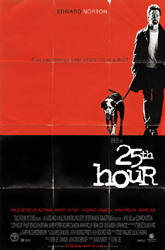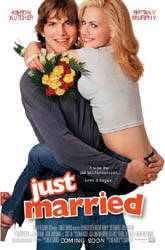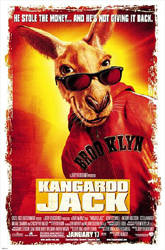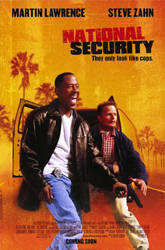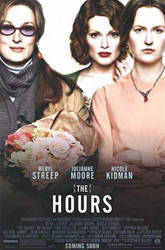 Director: Starring: Release: 27 Dec. 02
|
The Hours BY: DAVID PERRY "Each had his past shut in him like the leaves of a book known to him by heart; and his friends could only read the title." Virginia Woolf wrote in Jacob's Room of the secrecy within the male form. Her next novel, Mrs. Dalloway would continue this idea, but with a clearer grasp of the inefficiency of life, love, and death, and move even closer to herself by making the protagonist a woman. Michael Cunningham's novel The Hours and its film incarnation directed by Stephen Daldry cut close to the beliefs that Woolf made clear in her novels, so much that the main character in both the novel and the movie is Virginia Woolf. Having never read Cunningham's Pulitzer Prize-winning novel, I can only relish the way Daldry works with the Woolf text and the form in which he brings it to cinematic life. The Hours is, most certainly, a distressing work that revolves around death more than life -- which can be said about Woolf's novels and her own life -- but also one of the most assuredly filmed, literarily textured films of the year. Even as he unjustifiably throws in the occasional directorial flourish, the strength of his actresses, screenplay, and production continue to command the audience's attention around these mistakes. The film begins with the 1941 suicide of Woolf (Kidman), centering on the impotence she felt in the face of her own unpredictable psyche. Most film suicides are coupled with a moment of mental anguish or deficiency; Woolf's suicide, on the other hand, seems to be part of a rare (at least at this late point in her life) epiphany. When Woolf chooses to walk into a river with stones in her pockets, her reasoning is not based on some illogical belief but in a fear that her mind was about to go again. Woolf died so that she could save herself and her loving husband Leonard (Dillane) of the pain of a fifth mental breakdown. The rest of the film's Woolf scenes deal with the way she struggled with her own demons in the period between Jacob's Room and Mrs. Dalloway. Her feeble attempts to understand the route in which her life is going seems evocative of the inner turmoil felt by her next protagonist, Clarissa Dalloway. The Hours places Woolf's story in direct comparison with two other women's lives: the 1951 suburban depression of Laura Brown (Moore) and the 2001 urban resilience of Clarissa Vaughan (Streep). Cunningham (via Daldry and screenwriter David Hare) tries to bring to light the way all four women -- Woolf, Brown, Vaughan, amd Dalloway -- are all trying to make their own decision with the similar tribulations facing them. Laura Brown brings the film a sense of weakness similar to Woolf's. The two women struggle with the question of suicide and their own relationships to their husbands, both of whom try their best to help their wives but are only seen as impediments. Clarissa Vaughan is introduced completely different from her other two co-protagonists. While Laura and Virginia attempt to find some form of solace in their lives, Vaughan is simply trying to convince herself that she's already found it. Whether she has or not -- a good case could be made either way -- isn't important: Clarissa is, like Mrs. Dalloway, merely trying to prepare herself for the future ahead. If Laura seethes with the self-hate of Virginia Woolf, then Clarissa is a cockeyed optimist with her namesake Dalloway. The novel Mrs. Dalloway is as important to the narrative structure of The Hours as The Orchid Thief is to Adapation. While neither film is an exact recreation of the original texts, they both attempt to understand the themes of their sources through peripheral characters, whether they are the screenwriters adapting the text or the booklovers reading it. By commenting on a fictional heroine in light of three realistic (albeit still fictional in two of the three stories) women, The Hours achieves a synergy of emotional weight and feminine resolve. Some have accused the film as being a feminist treatise, questioning the film's
decisions to pose all three women as lesbians (Virginia Woolf was bisexual, Laura Brown
shares a kiss with one of her fellow suburbanites, and Clarissa Vaughan has found her life
partner in a younger woman). But The Hours never really places itself in the
direct opportunism of a politically or socially minded film. Instead, every scene of The
Hours serves as more of a view of the female condition under similar circumstances.
Watching these three women react in different ways to the sour grapes given to them is as
intoxicating as reading what Woolf wrote about just one similar woman. |
|
| ©2003, David Perry, Cinema-Scene.com, 17 January 2003 | ||

